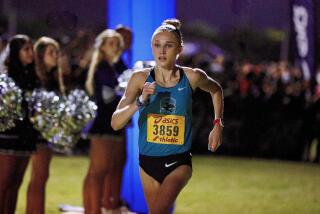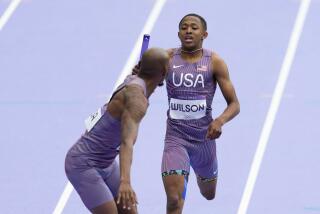In Long Run, Wilson Not Concerned About Fast Start
- Share via
Some people might be obsessed with quick fixes and instant gratification, but don’t put University of Arkansas distance runner Ryan Wilson in that company.
Wilson, a 1993 graduate of Agoura High and the No. 2-ranked 5,000-meter runner in the nation entering the qualifying heats tonight of the U.S. Olympic track and field trials in Atlanta, is prepared to plug away for years in pursuit of athletic excellence.
That’s because he and Razorback Coach John McDonnell contend that Wilson’s best performances are well down the road.
“No matter what he does this year, his career has just begun,” said McDonnell, who since 1984 has guided Arkansas to 26 NCAA titles in men’s cross-country, indoor and outdoor track and field. “I think with one more season of cross-country, you’re going to see a much better Ryan Wilson.”
Wilson ran a career-best of 13 minutes 28.6 seconds to win the 5,000 in the Mt. San Antonio College Relays in April. And, if the 21-year-old junior places among the top three in the trials final Friday, he will be the youngest 5,000 runner to represent the U.S. in the Olympics since 1972 when Steve Prefontaine placed fourth at Munich at age 21.
Prefontaine was the American record-holder in six events ranging from 3,000 to 10,000 meters when he was killed in a car accident in 1975, but Wilson knows he must improve greatly before he can think about such grandiose accomplishments.
“You can’t get too far ahead of yourself,” he said. “You have to go from point A to point B to point C. You can’t expect to go from point A to point E.”
Many track experts would contend Wilson did exactly that at Mt. SAC when he crushed his previous best of 13:53.30. But Wilson points out that his winning time of 7:51.66 to win the 3,000 in the NCAA indoor championships in March was indicative of a 13:30 time in the 5,000 outdoors.
Winning Mt. SAC did surprise him, however, as he sped away from a field that included Reuben Reina, a member of the U.S. team that competed in the 1991 World Championships, and Zambian and Arkansas teammate Godfrey Siamusiye, the 1995 NCAA cross-country champion.
“I was amazed that he showed so much poise,” said Bill Duley, Wilson’s cross-country coach at Agoura. “There were all kinds of lead changes and surges in that race, but he never lost sight of the leader. He always stayed within striking distance and he was in great position when it came down to the last lap.”
Duley’s surprise was understandable.
It’s unusual for a young and relatively inexperienced runner like Wilson to display such tactical savvy in a race against a field of world- and national-class competitors. In addition, Wilson performed poorly in several big races in high school, including the 1992 West regional cross-country championships.
Wilson, the State Division II champion, and Margarito Casillas of Hoover, the State Division I winner, entered the meet undefeated, but both ran poorly. Casillas placed 48th in the 5,000-meter race after fading badly in the final 800 and Wilson dropped out before the two-mile mark.
“I still can’t tell you why I stopped,” Wilson said. “But I just stopped. . . . I remember warming up before the race and thinking, ‘What would happen if I didn’t show up at the starting line?’ It was only a fleeting thought, but looking back, that was a sign that I wasn’t ready to run.”
Duley was shocked by what happened, but Wilson said it was a turning point in his career.
He didn’t know where his running was headed until then, but after watching the national championships in San Diego the following week, he realized he wanted to become an elite runner.
“That was the first time I had been on the outside looking in,” said Wilson, 28th in the 1991 national championships as a junior. “It made me think, ‘I know I can make something of myself.’ It gave me a sense of purpose of what I wanted to do.”
Unfortunately, that newfound focus was not immediately apparent in all of his performances.
Although he placed third in the 1,600 in the Arcadia Invitational and ran a season-best of 4:12.82 to win the Southern Section Masters Meet during his senior track season, Wilson clocked a pedestrian 4:30.00 for ninth in the State championships.
In his defense, it was hard to get excited about the 1993 State meet. Meet organizers originally canceled the finals because a morning rain left the all-weather track wet in spots and rescheduled them for two weeks later following public uproar over their decision.
“[Ryan] was ready,” Duley said. “His training had gone great, but when they canceled the [the State meet], he let go. And when they rescheduled it, he couldn’t get it back.”
Wilson’s reputation as a talented but inconsistent performer persisted during his two years at Arkansas, but a fifth-place finish in the NCAA cross-country championships last November went a long way toward erasing that image and did wonders for his confidence.
“He was a good cross-country runner, but when he finished fifth in the NCAAs and beat a lot of good people, that changed his whole outlook,” McDonnell said. “I think he then began to think, ‘Hey, I can run with anybody.’ ”
Improved health, which has allowed him to consistently run between 65 and 85 miles a week, having another year of experience under his belt and training with runners such as Reina, Siamusiye and Brian Baker, the top American finisher in the World cross-country championships in March, have all factored into Wilson’s success.
“The training level here and the people I train with have been invaluable to me,” Wilson said. “You train so hard here that there are times when you line up for a race and you think, ‘This can’t be any harder than what I did five days ago.’ ”
Wilson did suffer a setback in the NCAA championships three weeks ago when he failed to advance to the final of the 1,500, but McDonnell pointed out that the 1,500 is not Wilson’s primary event. It’s used to sharpen his speed for the 5,000.
“I would have liked to see him run better,” McDonnell said. “But I don’t think that performance is going to affect him at the trials. The 5,000 is a totally different race.”
Outside of running, Wilson is a fun-loving individual who enjoys listening to live bands and fishing for bass in the rivers and lakes of northwest Arkansas. Duley characterized him as a free spirit who “didn’t overcommit to any one thing” in high school.
“I definitely like having a good time,” Wilson said. “There is a time to play and a time to get serious, but I probably play more than most runners of my caliber. . . . I just don’t see any reason to go through my life unhappy. There are certain people who are always unhappy and I’m not going to be like that. I like having fun and I want the people around me to have fun.”
A similar attitude and immense talent helped transform Prefontaine into a cult figure in U.S. distance-running circles before he died, but Wilson isn’t trying to be Prefontaine’s clone.
“I’m not big on putting people on a pedestal,” Wilson said. “I don’t think it’s healthy. But in watching Prefontaine and reading about him, I have tried to take some of his qualities and apply them to my life. He had a purpose in what he was doing. He was out there to run hard every time he stepped on the track and I’ve tried to instill that quality in my running.”
Although Wilson will be a decided underdog at the trials to Bob Kennedy, a 13:02.93 performer, he’ll “try to put myself in position to finish in the top three.”
Even if he falls short in that quest, Wilson figures there will be other chances to qualify for the Olympics or World championships. He points out that he didn’t start running until his sophomore year in high school--after being named the most valuable player on Agoura’s freshman football team--and he still has a lot to learn about racing at the national- and world-class levels.
“There is so much more ahead of me to accomplish,” he said. “I’m not going to rush it. . . . It’s just going to take year after year of building a base and the foundation is not finished. I still haven’t started to build the house.”
More to Read
Go beyond the scoreboard
Get the latest on L.A.'s teams in the daily Sports Report newsletter.
You may occasionally receive promotional content from the Los Angeles Times.






